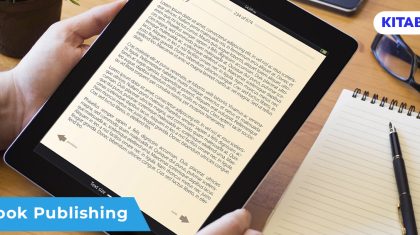Why K12 Schools should integrate eBooks and eBook Readers with their Learning Management Systems
In an era where technology and what is considered the concept of a better-prepared workforce are rapidly evolving, K12 education must maintain its growth. In this digital age, eBooks and eBook readers have emerged as valuable tools for modernizing education and enhancing the students’ learning experiences.
Therefore, it is strongly recommended that K12 schools integrate eBooks and eBook readers with their Learning Management Systems (LMS) to provide their students with a world-class education that prepares them for all future challenges.
In this blog, we will discuss and understand why cross-platform eBook readers should be integrated with Learning Management Systems and the benefits this change will bring.
Table of Contents
Why Consider Integrating eBook Readers with LMSs?
eBooks in K12 schools are revolutionizing how we impart education, thus making them a viable option for schools looking to modernize their curriculum. They provide students and educators with many interactive, multimedia-rich learning resources that can be accessed anytime, anywhere.
With eBooks, students can learn at their own pace, and educators can personalize the learning experience to meet the needs of individual students.
Here are a few advantages to using eBooks and integrating cross-platform eBook readers into a Learning Management System.
1. Improved Learning for Students
Integrating eBooks with an LMS can provide numerous benefits for both students and educators. An LMS software application allows educators to manage and deliver educational content, track student progress, and provide feedback.
With an LMS, educators can easily assign eBooks and track their students’ progress. This can help them personalize learning experiences and provide individualized learning to each student, tailoring the content to their needs and learning styles.
Additionally, an LMS can provide a platform for students to access eBooks from anywhere, at any time, on any device, allowing them to learn on the go and outside the traditional classroom setting.
This can help students develop a love for learning and foster a culture of lifelong learning.
Another significant benefit of integrating eBooks and eBook readers with an LMS is the ability to provide interactive and multimedia-rich content. eBooks can include videos, animations, and simulations, enhancing the learning experience and making complex concepts more accessible and understandable for students.
In addition, interactive eBooks allow students to engage with the content actively, promoting critical thinking and problem-solving skills.
With the rise of gamification in education, interactive eBooks can also provide a fun and engaging way for students to learn, helping to keep them motivated and interested in their studies.
2. A Multitude of Benefits for Educators Too
In addition to the benefits for students, integrating eBooks and eBook readers with an LMS can also provide numerous advantages for educators. With an LMS, educators can easily create and distribute eBooks, track student progress, and provide feedback.
This can help educators identify areas where students are struggling and provide targeted support to help them succeed.
Additionally, an LMS can provide educators with valuable data and insights into student learning. This allows them to make data-driven decisions about curriculum and instruction.
3. A Level Playing Field for All
Integrating eBooks and eBook readers with an LMS can help bridge the digital divide in many K12 schools. Many students need access to computers or other devices at home, and integrating eBooks with an LMS can give them access to digital resources they may not otherwise have.
This can help level the playing field for students and ensure that all students have equal access to high-quality educational resources.
With the increasing importance of digital literacy in today’s society, providing students with access to digital resources is critical to their future success.
Finally, integrating eBooks and eBook readers with an LMS can help K12 schools prepare their students for the challenges of the future.
As we advance towards a more digital and technology-driven world, students must have the skills and knowledge to succeed in this environment. Integrating eBooks and eBook readers with an LMS can help students develop digital literacy skills, critical thinking, and problem-solving, essential for success in the modern workforce.
4. Better for the Environment and Everyone’s Wallets
First and foremost, eBooks are environmentally friendly, eliminating the need for paper and ink and reducing the school’s carbon footprint.
With the increasing awareness of environmental issues and the need to preserve the planet for future generations, using eBooks in K12 schools can help schools positively impact the environment.
Additionally, eBooks are more cost-effective in the long run. They can be used repeatedly without needing replacement and are easily updated with new information, ensuring that students always have access to the latest and most accurate information in real-time.
With eBook readers, students can have equal access to all study materials no matter what devices they own.
Challenges to Expect
Despite the many benefits of integrating eBooks and eBook readers with an LMS, there are some challenges that schools may need to address. One of the main challenges is the initial cost of implementing an LMS and purchasing eBooks and eBook readers.
However, as mentioned earlier, eBooks can be more cost-effective in the long run, as they can be used repeatedly without needing replacement and are easily updated with new information. Schools may also need to invest in training for educators and students to ensure they are comfortable using the LMS and eBooks.
However, the benefits of integrating eBooks and eBook readers with an LMS far outweigh the initial costs, making it a worthwhile investment for schools looking to modernize their curriculum and provide their students with the best possible education.
Summing It Up
As we leap towards a more digital and technology-driven world, schools must keep pace with the changing times and provide their students with the tools, skills, and resources they need to succeed in the modern workforce.
By integrating eBooks and eBook readers with their LMS, schools can help ensure that their students are prepared for future challenges and have the skills and knowledge they need to succeed in a rapidly changing world.
To create world-class educational digital content, look no further than KITABOO. With its intuitive and user-friendly interface, KITABOO allows you to customize your content, add multimedia elements, and collaborate with team members in real-time.
The platform also offers advanced features such as analytics, assessments, and gamification to enhance the learning experience.
So, why wait?
Request a Demo today to learn more about our industry-leading services and help build a better future for your students.
Discover how a mobile-first training platform can help your organization.
KITABOO is a cloud-based platform to create, deliver & track mobile-first interactive training content.


